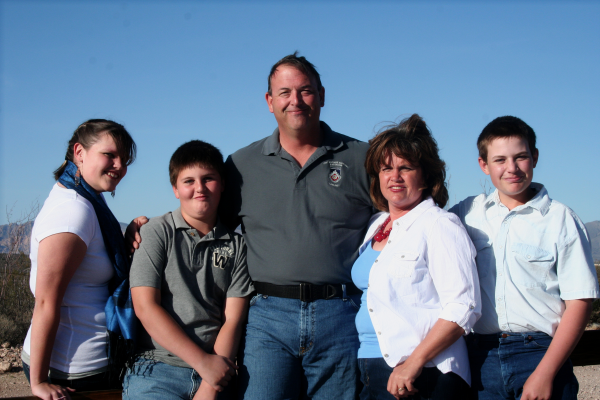Meet Arizona Agriculture's Gasho Family
Published
8/18/2014
By Peggy Jo Goodfellow, Arizona Farm Bureau: This first generation ranching family says they hope to leave a legacy of the land for and with their children and grandchildren.
In addition to being a wife,
An interview with Sonia Gasho, owner of Stronghold Beef in Pearce, Arizona.
Part of an ongoing series about Arizona agriculture's farmers and ranchers.
Tell us about your ranch: We ranch in Cochise County in semidesert grassland at an elevation of 4,500 to 6,500 feet. Our ranch is a typical public lands western ranch with
What changes have you seen in your lifetime as it relates to farming and/or ranching?We work together as a family closer than ever. Grocery shopping tends to be late in the day or at night! Have to be flexible with schedules and timing more than expected. I’ve learned several unexpected skills like running a generator and drawing blood for pregnancy testing cattle.

The Gasho ranching family
Why did you choose to go into agriculture? Ranching had been a dream of both of ours for some time. We wanted to have the opportunity to be good stewards of a piece of God’s creation. We also knew many ranchers and enjoyed their community and lifestyle. David’s family had a ranch in Tucson and he worked with his brother who managed several ranches. Sonia’s family owned small farms in Arkansas and
Will anyone in your family -
Would you ever consider growing an emerging crop or changing your farm or ranch model? We are interested in several operations and have or are considering direct marketing, retaining ownership, or backgrounding our own calves.
What are your community activities? Why are you involved?
Our other activities include:
- Cochise-Graham Cattle Growers, Arizona Cattle Growers for industry advocacy and legislative involvement,
- First Baptist Church of Sunizona, AWANA program
- 4-H program to help children learn leadership, develop skills
What is one fact/experience/achievement no one knows about you? One
What do you think you do really well? Teach! I
Why are you a farm bureau member? We got involved in Farm Bureau at the invitation of Ann and Paul Palmer. We were interested because of staying abreast of issues. We stay in Farm Bureau for that reason but also for the legislative lobbying, advocacy for agriculture, it’s
How will the next generation of farmers have to operate?Business savvy beyond the local sale barn, good personal skills, ability to communicate why agriculture is vitally important clearly, adaptability, as well as the basics of plant science and animal science.